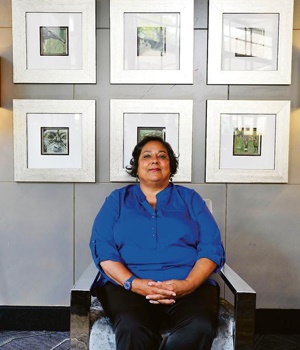
Trade union educator Sahra Ryklief is using a system she abhors – capitalism – to create millions for 23 struggling NGOs through Ditikeni, the investment company she chairs, writes Sue Grant-Marshall
Pin on the kinds of labels that sent the apartheid government into a tailspin – trade unionist, disseminator of banned literature, subversive educator – and you have Sahra Ryklief in a nutshell.
Yet, conversely, it’s almost impossible to slap a label on this self-propelled powerhouse, who dislikes the constraints of political organisations.
“I prefer the freedom of intellectual endeavours,” she declares in a surprisingly soft voice that struggles to make itself heard over the muzak of the swish Joburg hotel in Rosebank, where we’ve met.
She’s up from Cape Town, attired in an electric blue that complements soft eyes from which gleam a sharp and steely purpose.
Most people might be thinking of gentler things to do as they head into their sixties than chair and direct the Ditikeni Investment Company, now worth R100 million. Ditikeni means “something to lean on” in Tshivenda, which doesn’t quite convey just how much it means to so many NGOs.
She is also secretary-general of the International Federation of Workers’ Education Associations (Ifwea).
Yet this deceptively mild-mannered juggernaut will shortly stand for re-election to both positions. And we’ve not even mentioned the slew of other organisations she has chaired, directed or advised, from the Women on Farms Project to the Labour Research Service.
It was not long after Ryklief returned from obtaining her master’s degree in political science from the UK’s University of Liverpool in 1996 that she, in conjunction with 23 NGOs, established Ditikeni.
It is a 100% broad-based black empowerment investment company. Following the advent of South Africa’s 1994 democracy, it became clear to Ryklief that international donors were questioning why it was still necessary for them to support our local NGOs.
“[Democracy] led to drastic changes in the donor environment,” says Ryklief. This devastated organisations that had relied on outside funding for their survival. So the feisty labour educator took, in a manner of speaking, about 20 completely grass roots organisations by the scruffs of their necks and, with others, melded them into the Ditikeni Investment Company.
“It was really hard for these organisations to accept that we were going into the business of making money for ourselves. It was difficult for me, too,” says Ryklief, “because I don’t like the way that capitalism creates inequality.”
But she realistically accepts that the free market system dominates. “We have to use it in a way that creates independent income for our shareholders and sustains organisations such as Nicro, the Social Change Assistance Trust and the Church Development Trust.”
Ryklief emphasises that Ditikeni doesn’t do anything particularly different from other investment groups. However, when it approaches companies or individuals for investment, it points out that their returns might be slightly less than those offered by a commercial investment company.
“But part of that ‘return’ comes in having a direct social impact, because the people it supports are into self-help. They are the ‘doers’ of tomorrow. These are not charity hand-outs.”
When Ryklief rounded up the 23 struggling not-for-profit companies in 1999, she encouraged them to pool their meagre funds of R2.8 million, never dreaming their investments would be worth more than R100 million one day.
Ditikeni recently announced that this year’s annual distribution to its beneficiaries had increased by 20%, an increase for the ninth year in a row.
During this period, the total distribution to its NGOs was R10.5 million.
Ryklief has over the past 30 years turned down endless requests to head bodies, declaring herself, instead, “intrinsically a back room person and a strategist”.
“I like rescuing people, projects and initiatives.”
Ryklief did just that in 2007 when she first stood for the position of secretary-general of Ifwea.
This is a 72-year-old organisation that brings together a vast network of trade unions, NGOs and education institutions engaged in workers’ education. Back then, it was nearly dormant.
She not only executed a turnaround strategy for it, but developed an International Online Academy for Labour Educators.
Her passion for learning and educating stems from a happy but tumultuous childhood in Grassy Park on the Cape Flats. Her intellect was obvious from an early age, as she taught herself to read before she was five, consuming nearly all the books in three libraries near her home.
No wonder her teachers left her to more or less educate herself. She matriculated at 16 and, following her passion, began working in 1974 as a trainee librarian in the Provincial Public Library Service while she studied, by correspondence, towards her library qualifications.
Four years later, she was chief librarian in Grassy Park and lobbied her employers to support an in-house training programme she had designed for unqualified black library assistants.
She led an initiative for public libraries to provide study materials for impoverished students in black communities.
Throughout the 1980s and early 1990s, Ryklief coordinated an underground library of banned political literature that she stored in safe houses, “one of them being the basement of an old Jewish lady’s Sea Point home”.
It was illegal, of course, “but outwardly I was a settled, married mother of two, working in a public library”.
In 1990, she left the public library service to head the Trade Union Library.
Over the next four years, she developed and raised funds for a trade union education and resource publication programme, which in 1995 became the Trade Union Library and Education Centre.
Ryklief’s restless energy and determined intellect propelled her into adult education, where she designed courses, handbooks and manuals that she tailor-made for individual trade unions.
In 1996, she was elected to the executive committee of Ifwea at a conference in Belfast. The following year, in an unrelated move, she resigned from the ANC, “to focus on extra-parliamentary trade union and social justice movements”.
Today, her ongoing passion for education is emphasised by her being an adjunct professor at the School of Management and Labour Relations of Rutgers University, New Jersey, in the US.
She’s been teaching there online since 2010. It also marked the year she began contributing to a five-year global study on trade unions organising informal workers.
Ryklief relaxes by playing with her grandchildren, going to Muizenberg to swim, walking in the mountains and, unsurprisingly, still reading voraciously.




 Publications
Publications
 Partners
Partners








